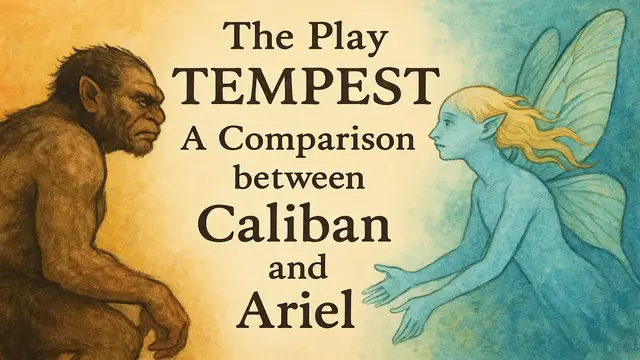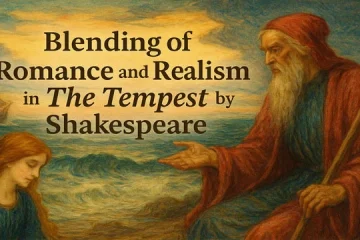Introduction:
Shakespeare’s “The Tempest” is one of those plays that stand for romanticism. Scholars observe that “The Tempest” is one of the most imaginative, most original, and most varied of Shakespeare’s romantic dramas. In it “the wild and the wonderful, the pathetic and the sublime are artfully and gracefully combined with the sportive sallies of a playful imagination.”
In it Shakespeare has “made the supernatural natural, and the wonderful ordinary.” In short he has “imagined new.” Prospero is the right Duke of Milan who was banished unlawfully. Now he lives on this unnamed island. Being a great magician, he has potent spirits to serve him. He is the master of this island. Antonio is his brother and the usurping Duke of Milan. In fact, it is because of Antonio that the tempest is raised for Prospero wants to teach a lesson to his wicked brother who, just to get the crown, betrayed his godlike elder brother and attempted at killing him along with his daughter Miranda. Miranda too lives on the island with her father.
Prospero’s Arrival on the Island of Sycorax:
Shakespeare has depicted the supremacy of human will in Prospero. In him he presents a man who is devoted to studies and does not run after worldly gains. Unfortunately, he falls a victim to the treachery of Antonio, his own brother. One midnight Antonio opened the gates of Milan; and, in the dead of darkness, banished Prospero and the crying child that is Miranda and usurped the throne of Milan. They hurried them in a boat; took them some leagues to sea, where they had prepared a rotten ship having not even sail, and mast. There they left them, to cry to the roaring sea, to sigh to the winds. Some food they had with some fresh water that was given by a noble Neapolitan, Gonzalo. Out of his charity, he being then appointed controller of this plan, gave them, with rich garments, linens, stuffs, and other necessary things. It was his gentleness, that knowing he loved his books more than the dukedom; he gave him from his own library volumes of books on magic. Somehow Prospero reached the island of the witch Sycorax. Now he lives on this unnamed island. Being a great magician he has potent spirits to serve him . He is the master of this island.
Sycorax, Caliban, and Ariel:
Prospero liberated Ariel from the prison of the foul witch Sycorax after her death. This blue – eyed witch was brought on that island with a child, and here she was left by the sailors. Ariel as he reported himself was then her servant and made her angry. She arrested him, by help of her more powerful ministers, into rift of a cloven pine. The son named Caliban that she delivered here was deprived of human shape. Caliban is a dull creature. Ariel and Caliban are now in Prospero’s service.
The Loyal Ariel:
Ariel is an airy spirit which serves Prospero faithfully in hope of getting liberty. When Ariel appears in the play for the first time, he greets his great master. He has come to perform whatever Prospero commands. He is ready to fly, to swim, to dive into the fire, and to ride on the curled clouds. Ariel with all his quality is ready to obey whatever he bids. Prospero asks if Ariel has performed perfectly the work of the tempest. Ariel assures that it is done perfectly. Prospero says that Ariel’s duty is exactly performed; but there’s more work for him. Prospero claims it is at least two hours past mid-day. The time ‘twixt six and now must be spent by both of them most carefully. Ariel asks for his liberty. Prospero declares that it should not be demanded before the time. Prospero warns to punish if Ariel complains more. Ariel asks for pardon. He promises to obey to the command gently. Prospero asks him to do so; and after two days he will be discharged.
The Disloyal Caliban:
Prospero claims that Caliban was uncivilized when Prospero found him on this island. Prospero has used him with human care just to civilize him. He kept Caliban in his own cell. But Caliban took its undue advantage and tried to violate the honour of Miranda, his daughter. It forced Prospero to be strict with Caliban. All the feelings of pity for him disappeared and Prospero reduced him to be a slave fit to perform mean duties like arranging for fire by bringing wood. If Caliban ignores his duties he is punished severely. In spite of being the most brutish, Caliban claims a great utility for them and they can’t miss him without causing discomfort to themselves. He does many useful duties like arranging for fire by bringing wood. It is wisdom to adjust with him.
“But as ‘tis,
We cannot miss him: he does make our fire,
Fetch in our wood, and serves in offices
That profits us.”
Miranda calls Caliban a horrible slave who has no goodness being capable of all ill. She feels sorry for showing pity on him. She took pains to make him speak, taught him each hour one thing or other. When he did not know his own meaning, she taught her language. He was the most brutish. Therefore, he was deservedly confined into this rock cave which is not more than a prison. Caliban claims that Miranda taught him language, and it is the advantage of it that he knows how to curse her and Prospero.
“You taught me language and my profit on’t
Is, I know how to curse. The red plague rid you
For learning me your language!”
Their Fate:
In this play Prospero awards freedom to his two slaves: Ariel and Caliban. Ariel gets freedom through sincere service while Caliban is too foolish to understand the meaning of freedom. For him change in master is freedom. Caliban wishes to kiss Stephano’s foot; and swears himself his subject. Stephano asks him to come on, and swear. Caliban promises to show them the best springs. He will pluck berries for him, bring fish for thee, and get him wood enough. He curses Prospero, his former master. He will bear him no more sticks, but follow Stephano who is a wondrous man. Caliban asks him to let him take to places where berries grow, he with his long nails will dig ground – nuts for him. Stephano asks him to lead the way without any more talking. He says to Trinculo that the King and all the company else being drowned, they will live there. He asks him to bear his bottle. He suggests Trinculo that they will fill Caliban’s mouth with wine by and by again. Caliban sings that he will no more bring fire nor make trenches, nor wash dish.
“Ban ‘Ban, Ca – Caliban,
has a new master – got a new man.
Freedom, high – day! high – day, freedom ! freedom, high
day, freedom!”
Prospero thinks about Caliban that he is a devil, a born devil, whose nature can never be changed on whom his pains taken on account of human ground are all lost, quite lost, and as with age his body grows uglier, so his mind grows corrupt. Prospero will punish them all, even to roaring.
“A devil, a born devil, on whose nature
Nurture can never stick; on whom my pains,
Humanely taken, all, all lost, quite lost;
And as with age his body uglier grows,
So his mind cankers. I will plague them all,
Even to roaring.”
Ariel, on the contrary, acts as an assistant to Prospero. It seems without Ariel Prospero is unable to perform wonders. Ariel brings his master to realize what is proper to think or do. It is Ariel who inspires Prospero to forgive the enemies for they have suffered a lot. Prospero makes Ariel and Caliban free when he leaves the island with his people of Milan. Caliban gets not only liberty but dukedom of the island also.
In this way Caliban and Ariel play important roles in the play. Some critics and scholars think that Ariel is symbol of Shakespeare’s imagination, the higher senses and Caliban is symbol of physical senses that are subject to mean desires.




